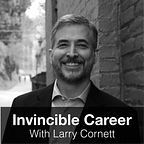
Disclosure: This post may contain affiliate links, meaning I get a commission if you decide to make a purchase through my links, at no cost to you.
How are you holding up? Have you found some healthy ways to manage the stress in your life? Watch the video I recorded on this issue.
I had a conversation with my Career Accelerator community this week about recent events in the U.S. that have added another layer of anxiety on top of everything else. We discussed how we handle the situation, manage our personal stress levels, and help our teams cope.
Stress is a killer. I don’t mean that figuratively, either. It literally harms your health.
Stress triggers an adrenaline dump and raises cortisol levels. It can manifest symptoms such as fatigue, headaches, digestive problems, weight gain, higher blood pressure, tightness in your chest, joint pain, memory issues, and problems sleeping.
For the longest time, I accepted high stress levels in my life — mostly due to work issues. I thought it was normal. I also thought that I could simply “push through it.”
But, I paid the price for not dealing with my stress. My health suffered — a lot.
I’ve since learned that I need to maintain my physical, mental, and emotional well-being just as I maintain any system to keep it running smoothly. It is not a weakness to admit that you need personal time to take your stress levels down a notch.
You’ll be more productive, happier, and successful in the long run when you make time to take care of yourself. You can’t prevent stressful situations from occurring. But, you can help yourself recover more quickly from them.
Here are some techniques that I have used to relieve stress over the years. They don’t only help me personally. I’ve found that actively managing my stress levels has dramatically improved my work productivity.
I hope this can help you too!
Calming routines
My morning routine calms me and helps me start the day right. We are often creatures of habit, and a predictable routine helps reduce anxiety.
It gives you a greater sense of control over your life. You are deciding what happens when.
Making coffee is one of my calming routines. I don’t use a machine. I either do a pour-over in my Chemex or a faster cup in my portable Aeropress.
With both techniques, I grind the beans, boil water, and brew the coffee manually. The physical actions and sensory elements are familiar (I’ve been doing it for decades). Going through the motions always clears my mind and calms me down.
Calming music
Do you remember your last visit to a spa or relaxing massage therapy session? You may have noticed that they always seem to be quietly playing tranquil music in the background. It almost puts me to sleep every time.
I wanted to replicate that feeling when I take a hot bath to relax, treat my aching muscles, and feel calm. So, I did some searching on Spotify and found a few playlists. One of them has over 13 hours of relaxing music!
Try them out the next time you want to bliss out:
Relaxing videos
Adding a visual element can boost the stress-busting impact. I’ve found a few videos on YouTube that can help relax you between stressful meetings. I can feel the release of tension even after watching them for a few minutes.
Even though travel is restricted, this is one way to still see the world. You can even take a walk through Hobbiton in one of the videos in my playlist!
I couldn’t help myself. I snuck some Bob Ross painting videos in there too. Is there anything more relaxing than listening to him talk while you watch him paint?
I’ll keep adding more videos as I discover them, so subscribe to that playlist if you want to keep updated.
Meditation
Meditation is magical, or so I’m told. Many of my friends love Headspace and recommend their app. Calm also provides solutions (including an app), for stress relief and meditation.
However, this will be a case of “do as I say, not as I do.”
I’ve tried traditional meditation in the past and struggled with it. I also find it challenging to be alone for enough time to meditate without interruptions.
However, certain types of activities do put me into a meditative state. I use them to calm my mind and relax.
For example, sketching patterns and doodling work really well for me. The physical action and pattern completion reduce my stress. I notice that my heart rate slows, and my breathing also becomes slower and deeper.
So, is it still meditation? I think so — and some agree — but I guess it doesn't matter if the result is the same and I experience the benefits.
Biofeedback
I have fun with my pulse oximeter. It measures my heart rate and blood oxygen saturation levels (useful to detect early symptoms of COVID). But, I mostly use it as a biofeedback device to help me calm down and reduce stress.
With practice, you can use real-time information from biofeedback to learn how to relax and control your body’s reactions to stress. I attach the pulse oximeter to a fingertip and get a live reading of my heart rate. Then, I practice deep breathing, calm my mind, and focus on slowing my heartbeat.
I’ve been able to take my heart rate from 80 to 50 in less than a minute using this technique. It immediately reduces your feelings of stress and anxiety too. We’ve made it a bit of a game in our house to see who can slow their heart rate the most.
Exercise
Daily exercise is my go-to stress-busting solution. If I miss my morning workout, I feel “off.”
Lifting weights always improves my mood and makes me feel more positive, even if it physically drains me. Surprisingly, physical fatigue eliminates my mental and emotional fatigue.
So, try to work exercise into your daily routine. It can be as simple as taking a long walk. Or work up to something more dedicated like weightlifting, yoga, cycling, or running.
Sleep
Getting enough sleep is one of the best things you can do for your health and reduces your stress levels. It’s tempting to cut corners and burn the candle at both ends to try to accomplish more. But, insufficient sleep is bad for your mind and body.
Sometimes, we think that we are sufficiently rested, but we aren’t getting enough deep sleep. The little things we do or don’t do can disrupt our sleep patterns.
Mark Sisson wrote The Definitive Guide to Sleep, which includes links to techniques to help you get a better night’s rest.
For example:
Reduce your exposure to blue light (our electronic devices emit it), especially near bedtime.
Keep your bedroom pitch black when you sleep (e.g., have nothing in the room that glows at all!).
Go to bed around the same time every evening.
Use your journal to capture those ideas and to-do items that are still buzzing around your brain.
Have a bedtime ritual that helps you prepare and get ready to sleep (e.g., I read a paper book for about 30 mins).
Outdoor time
I’ve talked about the benefits of “green exercise” before. Getting some natural sunlight is beneficial as well, especially at this time of the year.
Exposure to sunlight can increase your brain’s release of serotonin, which is associated with boosting your mood and helping you feel calmer. If you live somewhere that doesn’t have much sunlight in the winter months (e.g., Alaska), you should consider light therapy.
We bought this light therapy lamp a couple of years ago. My wife and I both suffer from some seasonal affective disorder when days are shorter. The lamp helps.
Close your laptop and go outside for a walk. Take a much-needed screen time break.
Laughter
Real laughter always improves my mood and reduces my stress levels. It’s hard to trigger it artificially. But, you probably know what makes you laugh.
I have a few books written by comedians and humorists. For example, I recently received Jerry Seinfeld’s latest book as a gift, Is This Anything? Several of his observations have made me laugh out loud.
You probably have some favorite comedians and sitcoms that make you laugh. Pull them up on YouTube the next time you need a stress break.
Laughter can:
Reduce stress hormones
Lower blood pressure
Boost T-cells in your immune system
Release positive endorphins
Healthy comfort foods
A healthy diet can reduce the effects of stress. It strengthens your immune system, improves your mood, and can lower your blood pressure.
It can be tempting to reach for alcohol when you’re feeling stressed. Having a drink takes the edge off. I was doing that for many months last year.
However, I wasn’t feeling good. My weightlifting training was suffering too. Alcohol inhibits protein synthesis, which impairs muscle growth.
Alcohol wasn’t doing me any favors, so I quit drinking cold turkey right after Thanksgiving. I haven’t had a drink since, and I feel much better now.
But, it doesn’t hurt to reach for your comfort foods once in a while. I like to cook a dish that I remember my mother making when I was a young child.
The smell and taste of those meals trigger memories too. It puts a smile on my face and makes me feel better.
Comforting entertainment
There’s a reason that so many people will rewatch their favorite shows or even reread an old book. The familiar is comforting.
Watching a “feel good” show from years ago has a positive impact on my mood (e.g., Northern Exposure). The effect is even greater when I watch a show from my childhood (e.g., M*A*S*H). Nostalgia kicks in, and you can “time travel” back to a happier moment in your life.
According to Clay Routledge, Ph.D.:
“Nostalgia increases positive mood, self-esteem, feelings of social connectedness, optimism about the future, and perceptions of meaning in life. Furthermore, nostalgia motivates people to focus on cultivating meaningful relationships and pursue important life goals. In addition, as people get older, nostalgia makes them feel youthful and energetic. Nostalgia also reduces existential fears about death.”
Sex
What can I say? Engaging in healthy, consensual sexual relationships has many benefits.
I’m sorry if this is uncomfortable. If so, scroll past this section and move on.
Research has found that people who have sex 1-2 times/week have higher levels of an antibody called immunoglobulin A. It can also apparently make you look 10 years younger. 🤷♀️
A healthy sex life can:
Boost your immune system
Lower your blood pressure
Reduce the risk of heart attack
Lessen pain
Improve your sleep
Reduce stress due to increased oxytocin, dopamine, and serotonin
Going solo still has many of the same benefits.
Talking with a therapist
Finally, you don’t have to struggle on your own. When stress and anxiety feel unmanageable, it helps to talk with a professional.
There are many online services:
BetterHelp - sessions with a dedicated professional therapist
Talkspace - unlimited therapy with a dedicated therapist
7 Cups - anonymous platform to connect with a compassionate trained “listener” or a professional online therapist
If you manage a team
Check-in with your teams and see how people are holding up. You can spend a few minutes doing this at the beginning of your weekly meetings, but I also encourage you to talk with your employees one-on-one. Not everyone is comfortable sharing how they are feeling in a group setting.
Be a source of compassion and care. Yes, we all have work to do, and projects must move forward. But, we’re also human beings, not machines.
Don't add more stress. Literally, have a dedicated meeting to discuss their well-being and do not bring up work projects. If they do and want to vent, that’s ok.
Let me know what helps you
What have you found works best for you? Do you have any other tried and true stress-busting techniques?
I hope that the current chaos in the world subsides a bit this year. Most things follow an ebb and flow pattern. What goes up must come down.
Feel free to chat with me in the comments if you’d like. Or, reach out to me. I’ve been told that I’m a good listener. 😉
This week’s professional development challenge
⭐ Break Your Big Goals into Subgoals
I would guess that your medium and large goals for this year are too big and complex to jump right in and tackle.
Larry Cornett is a leadership coach and business advisor who runs a supportive online community. He lives in Northern California near Lake Tahoe with his wife and children, and a gigantic Great Dane. He does his best to share advice that can help others take full control of their work and life. He’s also on Twitter @cornett.











